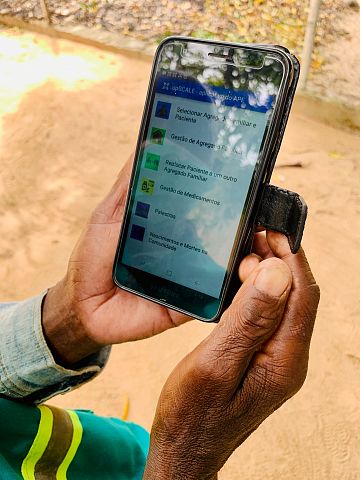Malaria Consortium findings highlight the need to better understand and support community health worker response to COVID-19
19 February 2021
Recent findings published by Malaria Consortium highlight the importance of understanding community health worker knowledge, attitudes and practices towards COVID-19 and how this insight can be used, in particular through digital health solutions, to strengthen pandemic response.
The COVID-19 pandemic has meant an additional burden placed on Mozambique’s health system to maintain essential services, including the provision of basic healthcare and health promotion in remote areas for malaria, pneumonia and diarrhoea by community health workers. Diagnosing COVID-19 at the community level is challenging, with symptoms similar to those of malaria and pneumonia. Misinformation arising from a lack of accurate and up-to-date evidence on the virus and limited access to affordable testing have all contributed to hindering the ability of community health workers to conduct routine activities and support the COVID-19 response.
In 2020, Malaria Consortium supported Mozambique's Ministry of Health in making adaptations to the existing upSCALE digital health platform, which allowed for the rapid gathering of essential insight into community health workers' knowledge gaps and misconceptions around COVID-19. The results helped shape and target relevant messages that have been vital in strengthening the Ministry of Health’s response to COVID-19.
The paper reports on a knowledge, attitudes and practices (KAP) survey developed as part of this scope of work and delivered to community health workers, known locally as agentes polivalentes elementares (APEs), via the upSCALE digital health platform between June and August 2020. The KAP was a cross-sectional study that was sent to all 1,065 active upSCALE registered APEs through their devices, inviting them to complete the survey consisting of 10 questions.
APEs, like all health workers, are at the frontline of the COVID-19 pandemic response, yet there is limited literature on their knowledge, attitudes and practices in relation to the pandemic. While technical guidance surrounding COVID-19 is available to support APEs, communicating this information has been challenging due to restrictions on travel, face-to-face group meetings and training, imposed from May to August 2020.
Results of the survey indicated that only a small proportion of APEs listed the correct COVID-19 symptoms, transmission routes and appropriate prevention measures specifically included in national health education materials. Misconceptions were mainly related to transmission routes, high risk individuals and asymptomatic patients. The findings show the continued need for further and ongoing education for community health workers in relation to COVID-19.
“This study demonstrates the importance of understanding APEs’ COVID-related knowledge, attitudes and practices when (feasibly) adapting digital health to better support their role in the COVID-19 pandemic response,” explains Kevin Baker, Malaria Consortium’s Research Advisor and co-author of the paper. “Adapting the existing upSCALE platform enabled a better understanding, in real time, of APEs’ KAP around COVID-19 management. We anticipate this research will further demonstrate the importance of greater investment in digital health as an enabler of stronger health systems, supporting frontline health workers to continue lifesaving work”.
Adaptations to the upSCALE digital platform enabled the Ministry of Health, supported by Malaria Consortium, to rapidly gather essential insight on the COVID-19 knowledge gaps and misconceptions of APEs. A daily series of SMS messages developed and shaped by knowledge gaps highlighted through the KAP study, were sent to a total of approximately 2,500 APEs (including all upSCALE app users) to reinforce Ministry of Health messaging and dispel misconceptions. Other adaptations included a dedicated education module, stock management of PPE materials, improved surveillance and reporting on COVID-19 and symptom tracking capabilities.
Access the PLOS ONE research article, ‘Community health worker knowledge, attitudes and practices towards COVID-19: Learnings from an online cross-sectional survey using a digital health platform, UpSCALE, in Mozambique’.
Digital health solutions reducing disease burden in Mozambique
Between 2009 and 2016, Malaria Consortium developed and tested an interactive mobile phone application called inSCALE to improve the quality of care provided by CHWs in Inhambane province. Based on the trial’s success, we created the digital health platform upSCALE together with the Mozambican Ministry of Health and Unicef.
The original upSCALE platform, created to further overcome limited access to primary healthcare for rural populations and poor linkages between APEs and the national health information system, supports a smartphone and tablet app that assists APEs with patient registration, diagnosis and advice on treatment and referrals. It also allows supervisors to monitor APE performance and stock levels of drugs and equipment. Data entered through the app is captured in the District Health Information System at district, provincial and national level and the ability to analyse local disease-specific trends in near real-time improves resource allocation. Mozambique’s Ministry of Health began a country-wide rollout of the app in 2019 – the first of its kind on this scale.
Malaria Consortium is committed to fighting the COVID-19 pandemic, for more information about how Malaria Consortium is adapting it work, visit the COVID-19 hub.
Keywords: Research
Latest news
- Malaria Consortium honoured by Ugandan government for contribution to combat malaria23rd April 2024
- International summit calls for AMR accountability in public health interventions21st March 2024
- Global SMC community celebrates new milestone at SMC Alliance Annual Meeting in Nigeria6th March 2024
- Scaling up key interventions could halve pneumonia-related childhood mortality13th February 2024
- Malaria Consortium and eGov Foundation join Mozambique’s national malaria programme to digitalise seasonal malaria chemoprevention campaigns8th February 2024
- World’s first malaria vaccine rollout launched in Cameroon22nd January 2024